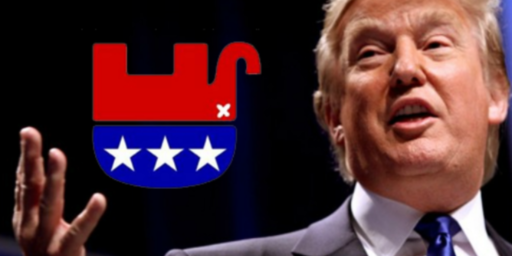Low Poll Numbers Liberate Bush
Craig Crawford argues that President Bush’s horribly low approval ratings may actually be something of a blessing.
Can bottom-of-the-barrel poll numbers actually liberate a second-term president to do whatever he wants? That certainly seems to be how George W. Bush sees things these days.
Mindful that he’ll never run for office again and seemingly unfazed by his dismal ratings (32 percent approval in this month’s Gallup poll, just 1 percentage point better than his worst ever), the president is doubling down on a variety of issues that helped make him so unpopular in the first place — from escalating the Iraq War to relaxing immigration laws and vetoing stem cell research.
Either Bush is making a visionary play that will win his redemption in the history books or else he seems destined to be remembered as one of the most spectacular failures of all time.
Far from being chastened by months of bad news from the pollsters, Bush remains defiant, refusing to back down to liberals and conservatives alike. Anti-war lawmakers on Capitol Hill gave up on getting this White House to compromise. And the president even went out of his way to infuriate his own conservative base with the immigration overhaul plan he’s put together with the Democrats.
[…]
Since modern polling began, only two presidents have been as unpopular for as long as Bush, and each represents one of the tracks Bush’s legacy might follow. Harry S Truman was too disfavored to run for re-election in 1952 but is now remembered well as an honest and plain-spoken leader. Richard Nixon resigned in disgrace in 1974 and never fully recovered from the stain of the Watergate scandal.
In job interviews, it’s customary to ask a candidate what they consider their greatest strengths and their greatest weaknesses. I’ve generally listed the same three traits for both questions, noting the need to be mindful to keep otherwise positive traits in check.
So it is with Bush and his natural confidence, decisiveness, and loyalty. While admirable traits, they can sometimes manifest as hubris, stubbornness, and inflexibility.
I honestly think he is oblivious to criticism and polls, so sure is he that he’s on the right course. On immigration, I continue to believe he’s fighting for the right principles and will be well judged by history. On stem cells, he’s likely swimming against the tide of progress but he’s motivated, mostly, be honest conviction. And, unless a miracle happens, it looks like Iraq is going to be a spectacular failure.
The president’s saving grace in these tough times could be the solace he can take in public attitudes toward the new Democratically controlled Congress. Those running Capitol Hill are now even less popular than he is. Confidence in Congress stands at 14 percent, the lowest in Gallup’s history of this measure. It’s also the smallest confidence level for any institution Gallup’s tested this year — lower even than big business or HMOs.
Indeed, the public is in such a lousy mood and so disgusted with Washington that Bush could well believe his low numbers are not his fault alone. Sure enough, anytime someone brings up his disastrous ratings, he and his aides quickly point out that Congress is in worse shape.
There’s some truth to that. The extreme polarization of American politics is something that Bush inherited, although he’s done plenty to stoke it. There’s a strong hard core that’s going to hate him no matter what.
Still, it’s silly to compare Congressional and presidential approval ratings. Approval ratings for Congress in the 40s are cause for celebration; for presidents, they’re a sign that things are going horribly wrong.
Congress is seldom popular for long. Legislating is a messy process, often compared to sausage making, and requires compromise, deal making, and raw politics — all things the public hates. Presidents, as unitary actors, can appear above that fray. They also have the ability, because of their Head of State role, to appear “presidential.”






If the approval ratings for Congress were in the 40’s, there might be little cause for concern but I see a couple of reasons for concern.
First, the Congressional approval ratings are in the low 20’s. Second, they’re trending sharply downward.
But I’m most concerned about the approach to hammering out agreements that we’re seeing. There are several differing approaches to forging a compromise. One is the Christmas tree approach: the more tinsel and ornaments that are on the tree, the better it looks. The other is the rabbit approach. How do you carve a sculpture of a rabbit? Start with a piece of stone and then cut away anything that doesn’t look like a rabbit.
The problem is that Congress is doing both simultaneously. The stone is completely gone—everything has been cut away and there’s no hope of a rabbit sculture. All that’s left is a huge pile of tinsel and ornaments. We can’t put together decent, minimalist agreements on reforming energy policy, healthcare policy, immigration policy, the structure of our military, or putting our fiscal house in order. We can agree to increase the pay of top-tier government officials, retain the subsidies on mohair and helium, build bridges that don’t go anywhere, and interstate highways in places that have no interstate road traffic. It’s a minarchist’s nightmare: the substantive necessary stuff can’t be done but the Congress is able to keep expanding the scope of government anyway.
That’s not just silly, it’s pathetic.
I may be wrong, but if you look at the data you will find that congresses numbers began to collapse following the Dems cave in to Bush on an Iraq timetable.
The country wants the president challenged and so long as the dems fail in this their numbers will continue to drop.
The real losers, of course, are the republicans.
As to whether GWB’s low poll numbers are liberating, my question is liberating to what end? What can he accomplish in the current state of things? Any domestic initiatives will be DOA. What is he liberated to do? Crack jokes? Play golf?
Exactly, Dave. What does anyone think Bush is likely to do that he wasn’t already doing? His tactics haven’t changed since they day he was first sworn in and abandoned ‘uniter-not-a-divider’ for ‘my-way-or-the-hiway’.
“…Bush is making a visionary play…”
Um, excuse me, Mr Crawford… you said some words there, but they don’t seem to make any sense in that configuration.
“What is he liberated to do? ”
Bomb Iran?